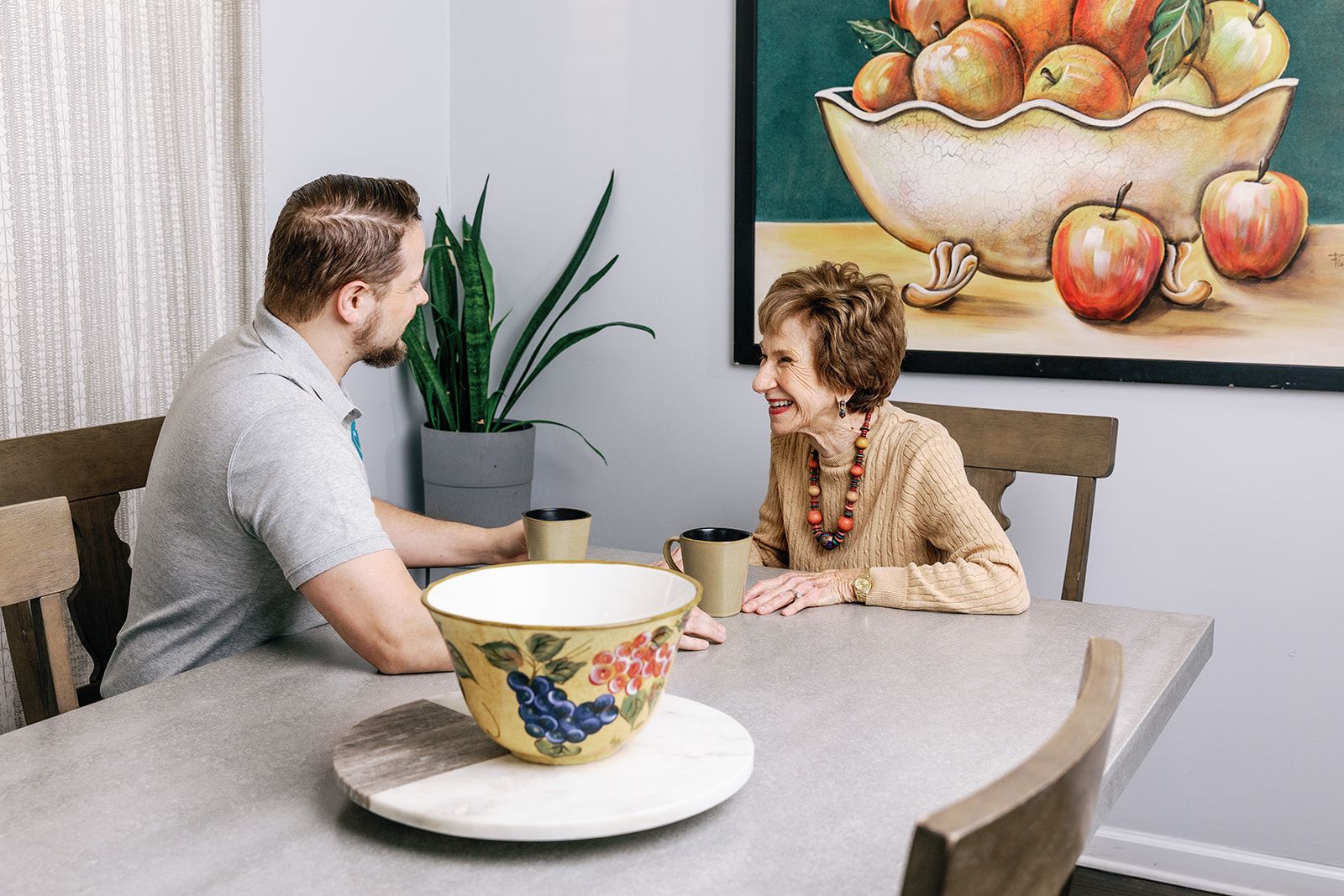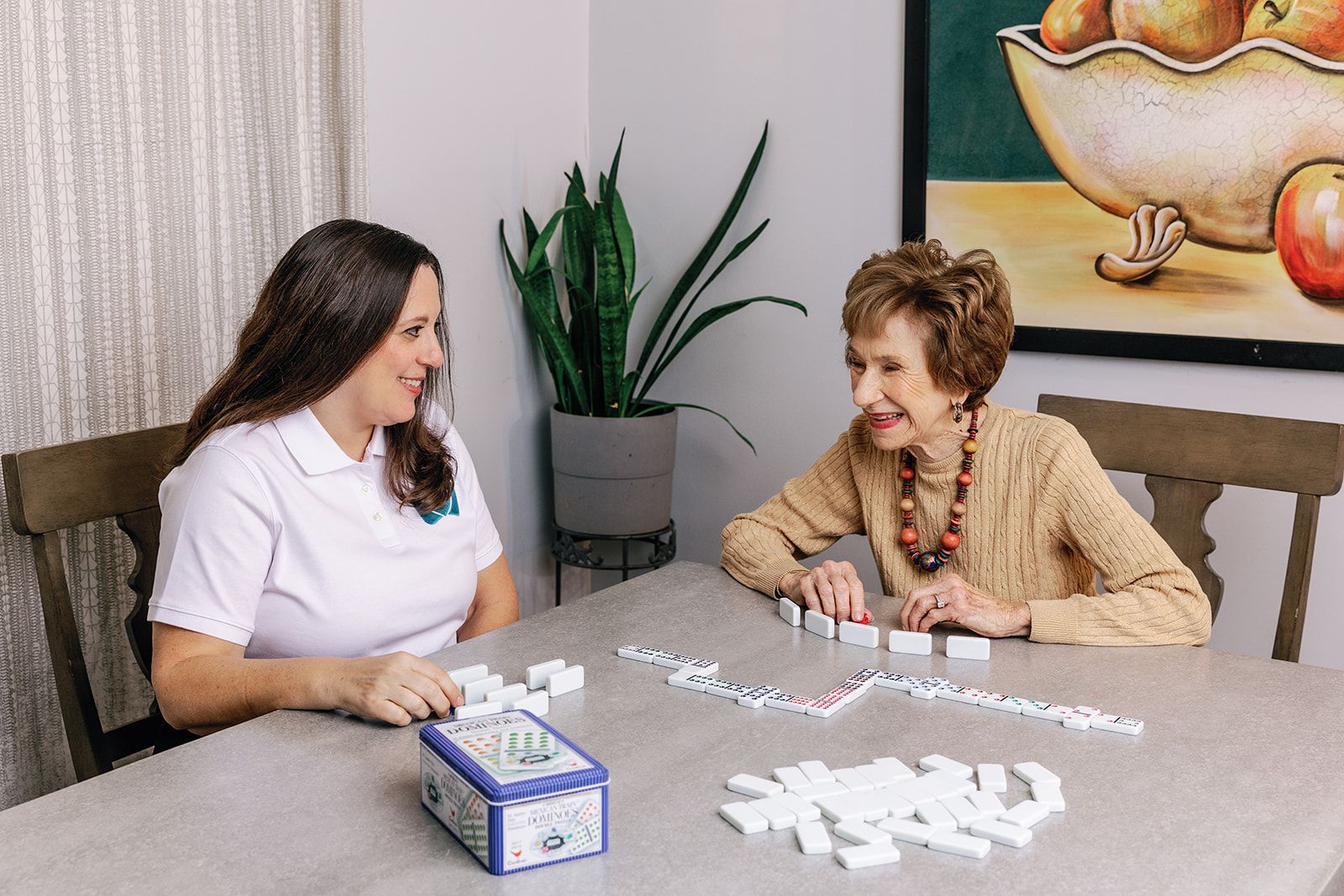21 Real-Life Hacks Every Family Caregiver Should Know
Caregiving is never a one-size-fits-all role. Most family caregivers are learning as they go: managing medications, doctor's appointments, fall risks, emotional needs, and burnout, all while juggling their own lives.
Whether you're new to caregiving or just trying to survive another week, these practical, life-tested hacks can lighten your load and help you care with confidence!
Table of Contents
- Build a Caregiver Command Center
- Make the Home Fall-Safe
- Use a Monitor to Rest Easier
- Try Dementia-Friendly Dinnerware
- Label and Sort Medications
- Automate Pill Reminders
- Upgrade the Bathroom
- Get the Right Mobility Aid
- Light Every Room Well
- Automate Recurring Bills
- Simplify the Closet
- Check on Emotional Wellness
- Create a Memory Wall
- Create a Hydration Station
- Use Routines to Create Calm
- Track the Day in One Spot
- Post Emergency Info Clearly
- Schedule Respite, Regularly
- Join Online Caregiver Communities
- Use Smart Apps and Tools
- Don't Wait to Ask for Help
1. Build a Caregiver Control Center
Designate a space, even just a small table, to organize all the details of care: medication lists, upcoming appointments, favorite meals, medical notes, and insurance info. Use a wall calendar, sticky notes, folders, or a dry-erase board to keep things visual and accessible. This keeps things out of your head and in one reliable place, especially if someone else needs to step in and help.
2. Make the Home Fall-Safe
Falls are a major risk for seniors. Walk through the home with their walker or cane in hand to identify trouble spots. Remove throw rugs, install grab bars, add non-slip mats, and consider motion-activated night lights in hallways or bathrooms. Even a single change can prevent a life-altering injury.
3. Use a Monitor to Rest Easier
For caregivers of someone with Alzheimer's or dementia, nighttime wandering or confusion can be scary. Consider a simple baby monitor or smart camera (some sync with your phone) to help you check in without disrupting your own sleep. It's an extra layer of peace of mind, especially if you're in another room or home.
4. Try Dementia-Friendly Dinnerware
Visual or physical challenges can make eating frustrating. Try high-contrast plates, cups with handles, or curved silverware that's easier to grip. Use a non-slip placemat to keep things steady. The goal is independence, not perfection, and mealtime should feel simple again.
5. Label and Sort Medications
Use colored stickers, permanent markers, or large print labels to mark pill bottles. Keep morning and evening pills separate. A clear system not only helps your loved one but also prevents you from second-guessing during a busy day. And yes, pill organizers still work wonders.
6. Automate Pill Reminders
Use your phone or a smart speaker to set daily reminders. Better yet, download a caregiver app that tracks dosages and refill alerts. Many caregivers also rely on devices like MedMinder or Hero, automated dispensers that lock until it's time to take a pill.

7. Upgrade the Bathroom
The bathroom is one of the most dangerous rooms for seniors. Install grab bars near the toilet and shower. Use a raised toilet seat and a shower chair. If budget allows, consider a walk-in tub or a handheld showerhead for easier hygiene routines.
8. Get the Right Mobility Aid
Don't assume a cane or walker is one-size-fits-all. Get a proper assessment from a physical therapist. The right device can reduce fatigue, prevent injury, and allow your loved one to participate in more daily activities with less help.
9. Light Every Room Well
Dimly lit areas create shadows that can confuse or disorient. Swap bulbs for soft white LEDs and add motion sensor lights in high-traffic areas. Natural light during the day also helps regulate mood and sleep cycles, especially for those living with memory decline.
10. Automate Recurring Bills
Use online banking to automate rent, utilities, and credit card payments. This takes one more task off your plate, and reduces the chance of missing a due date during busy seasons of caregiving.
11. Simplify the Closet
Reduce decision fatigue by keeping only seasonally appropriate, easy-to-wear outfits in your loved one's closet. Organize by day or event. If dressing has become difficult, adaptive clothing with magnetic closures or side openings can help preserve dignity and reduce stress.
12. Check on Emotional Wellness
Isolation and depression are common in seniors. Schedule check-ins with grandkids, visits from friends, or even a weekly phone call with a favorite relative. For caregivers, emotional support is equally critical, don't wait until you're burned out to ask for a breather.
13. Create a Memory Wall
Use photos, labeled family trees, or mementos in a shared area to spark recognition and conversation. This is especially grounding for those with Alzheimer's or cognitive decline. It can also help visiting caregivers or professionals connect more quickly.

14. Create a Hydration Station
Keep water bottles, electrolyte mixes, and favorite drinks easily accessible throughout the house. Seniors often forget to drink, or don't want to get up for water. Make it easier with visual cues or routines tied to hydration (e.g., drink after each meal).
15. Use Routines to Create Calm
Routine reduces anxiety. Try to anchor each day with predictable events: meals at the same time, walks after breakfast, or bath time before bed. Routines can be especially helpful for those living with memory impairment.
16. Track the Day in One Spot
Use a simple notebook or care journal to jot down meals, moods, bowel movements, or changes in behavior. This helps with doctor visits, med adjustments, and spotting patterns you might otherwise miss.
17. Post Emergency Info Clearly
Have emergency contacts, allergies, medications, and diagnoses printed and taped to the fridge or inside a cabinet. In an emergency, first responders (and backup caregivers) need info fast. You'll also want this for travel or temporary caregivers.
18. Schedule Respite, Regularly
You need rest. Whether it's an afternoon off, a weekend away, or simply a few hours to go on a walk or be alone, respite helps you show up refreshed. 4 Seasons offers short-term care relief services, even overnight. We're here when you need to catch your breath.
19. Join Online Caregiver Communities
Sometimes it helps to know you're not alone. There are incredible Facebook groups and forums filled with caregivers sharing tips, venting frustrations, and celebrating small wins. You might find your next great hack or simply feel seen.
20. Use Smart Apps and Tools
Try apps like CaringBridge, Lotsa Helping Hands, or Medisafe. These can help organize helpers, track symptoms, coordinate schedules, and even share health updates with family. Use what works and ditch what doesn't, the goal is less stress, not more.
21. Don't Wait to Ask for Help
Whether it's a neighbor picking up groceries or a professional caregiver stepping in a few hours a week, help is not a failure. It's love in action. And you don't have to do this alone.
4 Seasons Home Care: Atlanta's Best Caregiving Agency
At 4 Seasons Home Care, we're proud to be Atlanta's trusted source for both professional caregivers and families navigating the challenges of caring for a loved one. Whether you're a dedicated family member looking for a little breathing room through respite care or someone who feels called to serve as a caregiver, we're here for you.
Our team is built on compassion, consistency, and the belief that no one should do this alone. If you're looking for support, or looking to make a difference, we'd love to talk. Come join a team that truly cares, or let us care for the ones you love.
